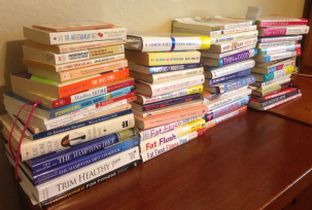
If we are better informed about health, we obviously can make better choices. Back 34 years ago when I first got into the nutrition field, there were just a few places to go for information about natural medicine and supplements. As recently as 19 years ago, when we started the radio show, I was still scrambling a bit to find good spokespeople. But, these days a massive number of physicians have become advocates of functional medicine. There is also a veritable flood of research data and so, I now have the opposite problem. Then of course there is the internet—the great (mis)information highway.
I was reminded of this information issue when I decided to change the way I store my personal collection of books—switching from health categories to alphabetical by author. I’m also putting them to a spreadsheet so that I can search by title and key words. Why all this trouble? It’s because I have well over 800 books! Below are some thoughts going through them has generated.
- Some authors perform a great service by researching exhaustively, writing with passion and balance. For example:
Naturopaths Joseph Pizzorno and Michael Murray wrote The Encyclopedia of Natural Medicine Third Edition, a wonderful reference that no home should be without. Their Textbook of Natural Medicine should be required reading for every doctor.
Some call our attention to the need for a nutrient. For example, lives have been saved by Could It Be B12? and Vitamin K2 and the Calcium Paradox.
Others save lives by warning us not to overdo nutrients—for instance, Dr. Levy’s Death by Calcium and Bill Sardi’s Iron Time Bomb. (It is now out of print, but I did find this article.)
Any book by Sherry Rogers, MD is a good bet because she supports all her recommendations with scientific studies.
(I don’t pretend that my work is in the same league with most of those above. However, I can say that I put a ton of work into Natural Alternatives to Nexium and The Probiotic Cure.They are based on many hundreds of studies and have been blessed with good reviews.)
- Sometimes authors are so far ahead of the parade that they are ridiculed. Robert Atkins, MD is a case in point. He wrote Atkins’ Diet Revolution in 1972. What he was saying 44 years ago about the obesity, diabetes and heart disease problems with starch and sugar is now “big news”.
- The photo above is of 62 weight loss books I have in my collection. Many of my other books have at least chapters on weight loss. (You’d think after all those words we would have solved the problem. Perhaps if we’d listened more to Dr. Atkins and less to the government, we’d be closer to a solution. )
- David Reuben, MD had a good idea. (No, I don’t think it was the namesake sandwich.) In his 1975 work, The Save Your Life Diet, he said that we could lower cholesterol and body weight with fiber. I was shocked to see that 4 decades ago he was also talking about fiber being food for our good bacteria—again, big news in research today. I do have 2 issues with his recommendations. (1) He gave the impression fiber was about all we needed and (2) giving the impression that everyone can tolerate wheat bran.
- Some authors go on a crusade, but their ideas are later disputed by science. For example, I have 2 books on the evils of coffee. Coffee has now been shown to reduce the risk of diseases such as diabetes and colon cancer.
- I MUST slim down the load on my overcrowded shelves. So, I’m getting rid of:
Books that were written just to promote a product in which the author had a financial interest
Vanity books written mainly to promote the writer’s celebrity
Books without original ideas…ones that say the same things that many others have, but not as well.
When I’m finished with this project I will still have too many books.










 June 23, 2016
June 23, 2016 